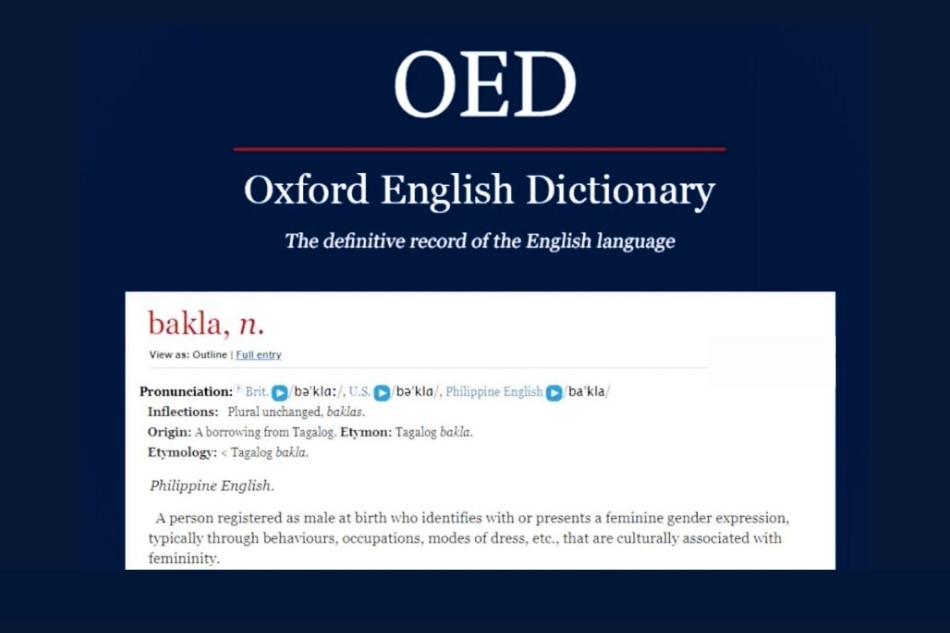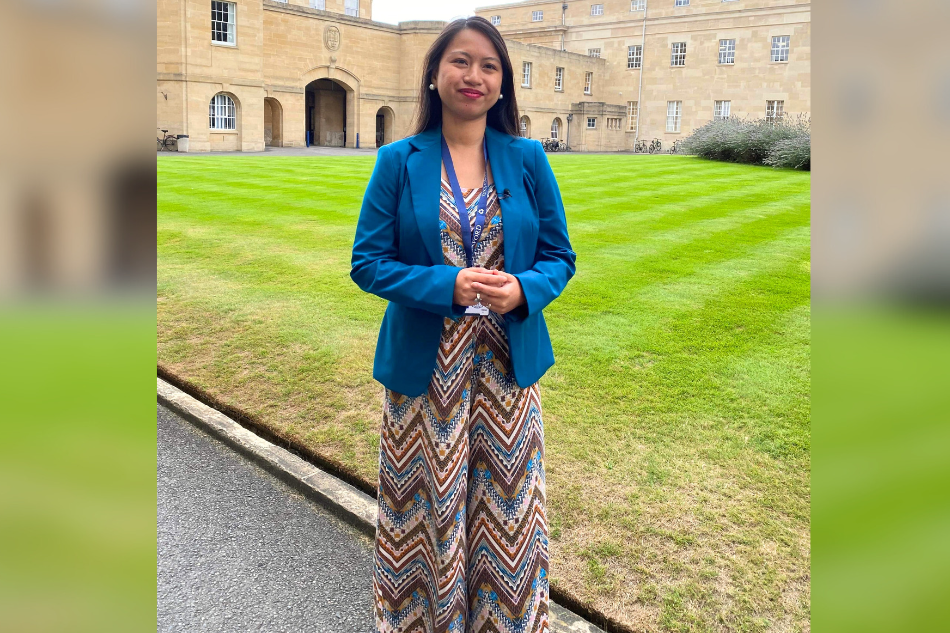Oxford English Dictionary’s Word of the Day: Bakla | ABS-CBN
ADVERTISEMENT

Welcome, Kapamilya! We use cookies to improve your browsing experience. Continuing to use this site means you agree to our use of cookies. Tell me more!
Oxford English Dictionary’s Word of the Day: Bakla
Oxford English Dictionary’s Word of the Day: Bakla
TFC News
Published Jun 23, 2023 11:07 PM PHT
Sa pagdiriwang ng Philippine Pride Month ngayong June 24, 2023, inanunsyo ng Oxford English Dictionary (OED) na ang kanilang Word of the Day ay ang Filipino term na bakla.
Sa pagdiriwang ng Philippine Pride Month ngayong June 24, 2023, inanunsyo ng Oxford English Dictionary (OED) na ang kanilang Word of the Day ay ang Filipino term na bakla.
Ayon kay Dr. Danica Salazar, Executive Director for World Englishes ng OED, pormal itong ihahayag ngayong June 24, 2023, alas-2:00 ng hapon sa Pilipinas at alas-7:00 ng umaga naman sa UK.
"We’ve been highlighting sex and gender terms in our Twitter feed as part of our Pride Month series, so when we learned that Manila Pride would be held on 24 June, we thought it the perfect date to put a spotlight on our entry for bakla," pahayag ni Salazar sa panayam ng TFC News.
Noong 2022, naidagdag sa Oxford English Dictionary (OED) ang salitang bakla, kasama ng ilan pang terminong mula sa iba pang lenggwahe na gamit sa LGBTQIA+ community.
Sa pagpapakahulugan ng OED, ang bakla ay:
"A person registered as male at birth who identifies with or presents a feminine gender expression, typically through behaviors, occupations, modes of dress, etc., that are culturally associated with femininity.”
Ipinaliwanag din sa OED definition na ang terminong bakla ay kadalasan "derogatory" o ginagamit para manlait ng kapwa.
Gayunman, dagdag pa ng OED:
"Bakla encompasses a wide range of gendered characteristics and practices that do not correspond to heteronormative ideas of masculinity. It can often, but not always, denote homosexuality, although the term is increasingly being used as a synonym for Western terms relating to sexual orientation, such as gay and homosexual.”
Kwento ni Salazar sa TFC News, napag-alaman ng kanilang team na ang salitang bakla ay may sapat na katangian para maipasok sa OED.
Ayon kay Dr. Danica Salazar, Executive Director for World Englishes ng OED, pormal itong ihahayag ngayong June 24, 2023, alas-2:00 ng hapon sa Pilipinas at alas-7:00 ng umaga naman sa UK.
"We’ve been highlighting sex and gender terms in our Twitter feed as part of our Pride Month series, so when we learned that Manila Pride would be held on 24 June, we thought it the perfect date to put a spotlight on our entry for bakla," pahayag ni Salazar sa panayam ng TFC News.
Noong 2022, naidagdag sa Oxford English Dictionary (OED) ang salitang bakla, kasama ng ilan pang terminong mula sa iba pang lenggwahe na gamit sa LGBTQIA+ community.
Sa pagpapakahulugan ng OED, ang bakla ay:
"A person registered as male at birth who identifies with or presents a feminine gender expression, typically through behaviors, occupations, modes of dress, etc., that are culturally associated with femininity.”
Ipinaliwanag din sa OED definition na ang terminong bakla ay kadalasan "derogatory" o ginagamit para manlait ng kapwa.
Gayunman, dagdag pa ng OED:
"Bakla encompasses a wide range of gendered characteristics and practices that do not correspond to heteronormative ideas of masculinity. It can often, but not always, denote homosexuality, although the term is increasingly being used as a synonym for Western terms relating to sexual orientation, such as gay and homosexual.”
Kwento ni Salazar sa TFC News, napag-alaman ng kanilang team na ang salitang bakla ay may sapat na katangian para maipasok sa OED.
"We recently carried out an editorial project that looked specifically at words related to sex and gender, and in our research we identified bakla as a gender-related term with enough currency and social significance in the Philippines to be included in the dictionary," pagbabahagi ni ni Salazar, Executive Director for World Englishes ng OED.
Mabusisi ang proseso sa pagpili ng mga katagang idinadagdag sa OED, ayon pa kay Salazar, lalo't taun-taon, daan-daang libong salita ang iminumungkahi sa kanilang tanggapan.
"Once we have a list of candidates, OED editors go to work carefully researching our electronic and paper research databases to make sure that there are several independent examples of the word being used, for a reasonable amount of time and reasonable frequency in the places you would expect to find them. There is no exact timespan and frequency threshold, as this may vary depending on each word. Some words are relatively young, but they were quickly added to the OED because of the huge social impact they had in such a short space of time; other words are not overwhelmingly frequent, but are included because they are of specific cultural, historical, or linguistic significance," sabi ni Salazar.
Para kay Salazar, mas mahalaga sa pagkakasama sa OED ng salitang bakla ang mismo ng katagang ito para sa pagsulong ng LGBTQIA+ community sa bansa.
"It’s not the inclusion of the term bakla in a dictionary that is significant to the development of the LGBTQIA+ movement in the Philippines, it’s the word bakla itself that is significant. That’s why it was added to the OED in the first place—because we’ve found sufficient evidence of the word being used in Philippine English as far back as the late 1960s.
For decades, speakers of Philippine English have been using bakla—people who identify as bakla use it to refer to themselves, activists use it in talking about LGBTQIA+ issues, writers and scholars use it in their works," pahayag ni Salazar.
Ang pagkakasama sa OED NG bakla, ayon pa kay Salazar, ay sumasalamin sa nagbabagong pag-unawa ng mga Pinoy sa salitang ito kasabay ng pagtingin sa mga miyembro ng LGBTQIA+ community.
Sabi niya: "The OED entry for bakla only serves to show how the meaning and usage of the word have evolved through time, just as Filipinos’ understanding of and attitudes towards sexuality and gender have changed through the years, thanks in large part to the efforts of the Philippine LGBTQIA+ movement."
Samantala, bukod sa bakla, sinabi pa ni Salazar na hindi naman malabo na balang araw, may iba pang salitang Filipino ang maisasama rin sa OED.
"The OED is committed to documenting the unique vocabulary of different varieties of English spoken around the world, and that includes Philippine English. You can expect to see more Philippine English words in future OED quarterly updates," pagtatapos ni Salazar.
"We recently carried out an editorial project that looked specifically at words related to sex and gender, and in our research we identified bakla as a gender-related term with enough currency and social significance in the Philippines to be included in the dictionary," pagbabahagi ni ni Salazar, Executive Director for World Englishes ng OED.
Mabusisi ang proseso sa pagpili ng mga katagang idinadagdag sa OED, ayon pa kay Salazar, lalo't taun-taon, daan-daang libong salita ang iminumungkahi sa kanilang tanggapan.
"Once we have a list of candidates, OED editors go to work carefully researching our electronic and paper research databases to make sure that there are several independent examples of the word being used, for a reasonable amount of time and reasonable frequency in the places you would expect to find them. There is no exact timespan and frequency threshold, as this may vary depending on each word. Some words are relatively young, but they were quickly added to the OED because of the huge social impact they had in such a short space of time; other words are not overwhelmingly frequent, but are included because they are of specific cultural, historical, or linguistic significance," sabi ni Salazar.
Para kay Salazar, mas mahalaga sa pagkakasama sa OED ng salitang bakla ang mismo ng katagang ito para sa pagsulong ng LGBTQIA+ community sa bansa.
"It’s not the inclusion of the term bakla in a dictionary that is significant to the development of the LGBTQIA+ movement in the Philippines, it’s the word bakla itself that is significant. That’s why it was added to the OED in the first place—because we’ve found sufficient evidence of the word being used in Philippine English as far back as the late 1960s.
For decades, speakers of Philippine English have been using bakla—people who identify as bakla use it to refer to themselves, activists use it in talking about LGBTQIA+ issues, writers and scholars use it in their works," pahayag ni Salazar.
Ang pagkakasama sa OED NG bakla, ayon pa kay Salazar, ay sumasalamin sa nagbabagong pag-unawa ng mga Pinoy sa salitang ito kasabay ng pagtingin sa mga miyembro ng LGBTQIA+ community.
Sabi niya: "The OED entry for bakla only serves to show how the meaning and usage of the word have evolved through time, just as Filipinos’ understanding of and attitudes towards sexuality and gender have changed through the years, thanks in large part to the efforts of the Philippine LGBTQIA+ movement."
Samantala, bukod sa bakla, sinabi pa ni Salazar na hindi naman malabo na balang araw, may iba pang salitang Filipino ang maisasama rin sa OED.
"The OED is committed to documenting the unique vocabulary of different varieties of English spoken around the world, and that includes Philippine English. You can expect to see more Philippine English words in future OED quarterly updates," pagtatapos ni Salazar.
ADVERTISEMENT
ADVERTISEMENT




